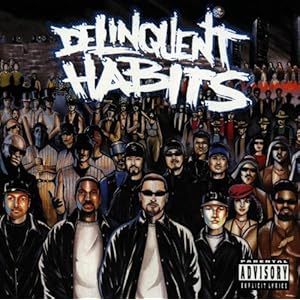Latinos have been a part of hip-hop culture since the beginnings of the genre, but it took a while for artists to develop a workable strain of hip-hop that combined classic old school boom-bap with the mariachi horns and flamenco guitar licks of Latin music. As often happens, the two genres did not fit together naturally at first. Artists like Mellow Man Ace and the Beatnuts brought Spanglish and other assorted lyrical tricks to the table, but the actual combination of the two styles was still a novelty at the beginning of the 90s. Cypress Hill, arguably the first great Hispanic hip-hop group, merged some of those innovations to gangsta rap, with its vituperative collective rage against institutional racism and LAPD brutality. In terms of production, however, gangsta rap tended to be suspicious of sounds that could be construed as novelty. On Cypress Hill’s early albums, there was a resistance to genre signifiers such as brassy trumpets. The sounds were sometimes there, but never in the forefront, because the basic vocabulary had yet to be developed.
By 1996, however, artists like Big Pun and Fat Joe had precipitated a wave of Hispanic rap artists, and outside of America, a reggae and dancehall revolution was brewing. In this period before Latino crossover sounds took over pop radio, there was a lot of really interesting, even bizarre rap music that attempted to cross genres in ways that wouldn’t seem winking or overdone. Often this wouldn’t work, but sometimes some bizarre alchemy was achieved, as was the case with Delinquent Habits. Under Cypress Hill rapper Sen Dog’s tutelage, Delinquent Habits struck a mighty vain of hip-hop fusion in their self-titled debut album that resembles not much else of its genre. The group, consisting of MCs Ives and Chente Loco and DJ WizA, wedded an old school vibe to lyrics that mixed Spanglish, Spanish and English with gleeful skill. Though the group are not as influential as Cypress Hill, their debut demands reconsideration, beginning with the opening bilingual rattler “Tres Delinquentes.”As someone who doesn’t know more than a few words of Spanish, I’m not one to vouch for the two emcees’ bilingual skills, but whatever they happen to be saying, it goes along perfectly with the mariachi trumpet and acoustic guitar strums.
These brilliant exercises at genre fusion go beyond just Latin music and hip-hop. Delinquent Habits is also among the few albums this side of the Judgment Night soundtrack to feature a decent rap-rock cut with a live band, “When the Stakes Are High.” That song, the album’s final track, contains guitar work so gnarly that it could have been air-dropped into an Anthrax or Suicidal Tendencies song. Like many cuts on the album, it can seem off-putting and schizophrenic at first, but Ives and Loco’s raps hold everything together. They could throw together brilliant hooks, too: “Juvy ain’t shit but practice for the state pen/Out for a month and I’m back innnnnn” being a good one. Videos were made for two singles, “Tres Delinquentes” and “Lower Eastside,” but the album’s greatest accomplishment is probably the eighth track, “Good Times.” A reflective, emotional number anchored by a mournful Clarence White guitar sample (from the Byrds version of Dylan’s “Lay Lady Lay”) the chorus of “Good Times” is its message: “Even though I said my life was bad/I reminisce on all the good times that I had.” Rejecting both the macho pride in violence and the operatic self-pity of many inner-city autobiographical raps, Ives and Chente Loco suggest that the bad side of growing up can easily poison one’s childhood recollections. However, by contrasting those memories with fleeting moments of genuine happiness, one can make productive, uplifting art. Not an original message, nor is it necessarily a perfect argument, but this is a nuanced, thoughtful view of transcending individual experience that is rarely expressed so plainly. Delinquent Habits is full of hybrid moments like that, and nearly all of them work.

No comments:
Post a Comment